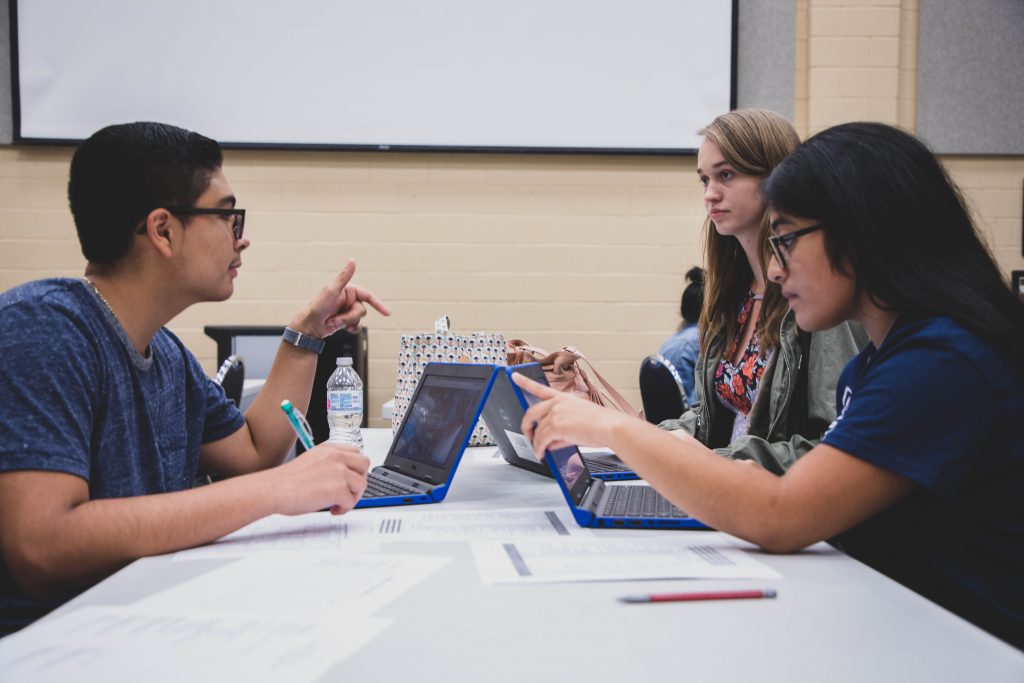What is an IB School?
 Metro Atlanta parents are lucky to have a myriad of top-notch educational options for their children. Sometimes the differences in the academics and environments can be overwhelming to digest. This is especially true when you come across specialized programs with terms and concepts with which you are unfamiliar.
Metro Atlanta parents are lucky to have a myriad of top-notch educational options for their children. Sometimes the differences in the academics and environments can be overwhelming to digest. This is especially true when you come across specialized programs with terms and concepts with which you are unfamiliar.
While you were Googling, did you see the term International Baccalaureate or IB? You probably have since there are 91 IB programs in Georgia, including 33 elementary school options, as well as dozens of middle and high school programs in the metro area alone. IB programs are available at both public and private institutions, including some boarding schools, and have to be approved programs.
The focus of International Baccalaureate learning, which began in 1968 in Switzerland – is that students own their learning. Children have a say in what they learn and how they learn it. They also explore how the subject applies to their lives now and how it relates to history and the global perspective. IB programs empower students to be curious, open-minded and reflective. The curriculum allows children to take risks, collaborate with others, and acquire deep knowledge.
Table of Contents
The 411 on IB
International Baccalaureate programs vary from school to school but are all built on the same core elements. You can learn more and find the list of schools in Georgia at ibo.org. Here is a quick look at some of the elements of IB.
- Four stages of IB learning: Primary Years Programme (PYP): Ages 3-11; Middle Years Programme (MYP): Ages 11-16; Diploma Programme (DP): Ages 16-19; Career-related Programme (CP): Ages 16-19 with a focus on career-specific learning
- IB can be taught in English, French or Spanish.
- Five essential elements of IB learning: Concepts: What ideas do students want to explore? Knowledge: What specific information are students trying to collect and understand? Skills: What do students need to able to be successful? Attitudes: What values and beliefs do students have toward what they are learning? Action: What behaviors do students have and how are they modeled by teachers and peers?
- Each Program of Inquiry (POI) and Unit of Inquiry (UOI) IB students tackle are examined through a trans-disciplinary model. For example, if students are exploring the concept of animal habitats, they would gain information from books, create models of various habitats, and discuss how the world around the animals effects culture.

Marietta High School
Spotlight on IB in Atlanta
Marietta High School is one of the IB public schools in the area that offers both the DP and the CP. “At MHS, we have an ‘IB for all’ philosophy,” says Barbara Manwell, the IB Programmes Director at Marietta High School. “While we have two IB programs for our juniors and seniors, we also allow students to take individual IB courses based on their own goals and interests. This allows our students to use IB in the way that benefits them most.”
MHS also has the MYP in which all 9th and 10th graders participate, regardless of the course and their level of academic study. In Fulton County, there is a set of public schools through which students can experience K-12th grade IB learning. Heards Ferry Elementary students take part in the school’s IB program that includes Spanish language and cultural learning; in middle school, these students feed into Ridgeview Charter School. Riverwood International Charter School completes the journey with their MYP and DP offerings.
At Atlanta International School, located in Buckhead, every student studies the IB curriculum with a focus on language immersion. Everyone learns alongside one another, offering diversity of learning ability within every classroom and embodying the intentionally inclusive ethos of the IB curriculum.
While IB learning is a process and a different way of thinking, students can be successful in the program even if they begin in middle or high school.
“Our Sixth Grade Academy and our Middle School are both MYP schools, which then establish a basis of the IB philosophy for all MHS students,” Manwell says. “Nonetheless, students who transfer into MHS can integrate easily into our MYP, and even our IB Diploma and Career-related Programs.”
With smaller student-to-teacher ratios, private schools may be able to give your child more personalized attention if they do struggle with the IB program at the beginning.
The Right Fit
All students can benefit from International Baccalaureate learning, but it isn’t necessarily the right fit for every learner as it is a rigorous curriculum. Before applying to an IB program, try to determine your child’s willingness to self-motivate and speak with past teachers to know classroom habits. Understand what supports are in place at the school you are considering since that is a key determinant of success in an IB program.
MHS employs an “IB for all” approach. “Our strong MYP in the 9th and 10th grades builds communication, research and critical thinking skills that create a foundation for success for every student,” Manwell says. “Those who choose to take even one IB course in 11th and 12th grades will be better prepared for success in college, the workforce or the military because of the rigor and growth they encounter in those classes.”
IB’s focus on learning as a process can be helpful for all students. The IB program can benefit every child with the way students are encouraged to learn, as it focuses on the “why,” not just the “what.” IB is not about learning by rote and standardized testing. At AIS, the IB program is used to develop students who are global citizens and critical thinkers with an emphasis on language, resilience and risk-taking to shape the world for the better. AIS students from all over the world learn alongside local children, finding connections and embracing language and cultural difference to become more developed individuals.

Atlanta International School
Practical Applications
IB learning has real-world applications that benefit all children. Trans-disciplinary learning independent projects that are core to the IB program allow students to explore topics and create solutions for problems in which they are interested.
At AIS, learning programs are centered in a real-world context, empowering students to be critical thinks and problem solvers. Completing the DP creates students who are prepared for life at college as highly independent learners and community-minded leaders who have had the best academic preparation. Younger students also benefit from an IB program because of the breadth of learning and inquiry-based approach. The application of the IB makes students’ understanding of everything they learn deeper and more contextualized than through standard curriculum.




